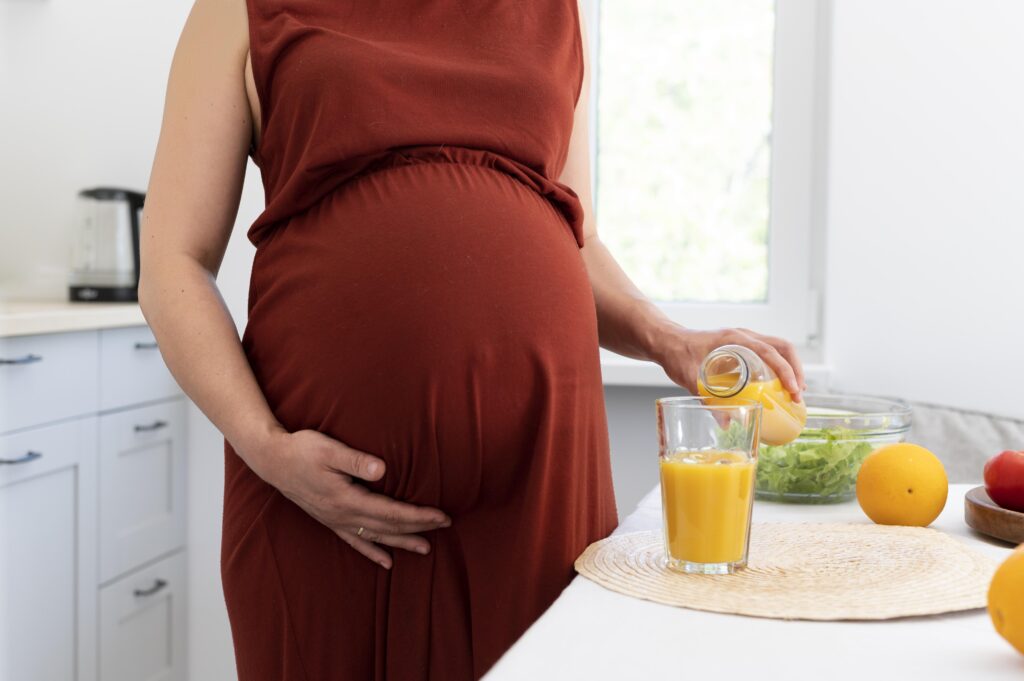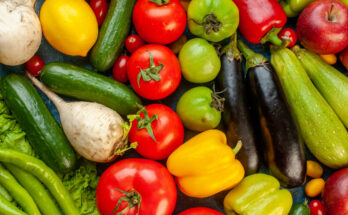Which Fruits and Vegetables Are Good for Pregnant Women? Pregnancy is a life-changing journey where nutrition should be carefully considered. What you eat during pregnancy is one of the most important factors for your baby’s growth and development, and your health and well-being. Fruits and vegetables are some of the healthiest foods you can eat during pregnancy. They are loaded with vitamins, minerals, antioxidants, and fiber, and they are an important part of proper nutrition since they not only support fetal development and immune function but they help with common pregnancy-related symptoms such as constipation and morning sickness while also promoting good digestion to help you feel better throughout your pregnancy.
Which Fruits and Vegetables Are Good for Pregnant Women?
In this article, we will explore the best fruits and vegetables for pregnant women, what nutrients they contain, and why they’re important, as well as how to use them in our everyday nutrition.
how cam i promate my digital products faster
which fruit are good for healthy skin
1.Why Are Fruits and Vegetables So Important When Pregnant?
Fruits and vegetables can offer a wide variety of benefits for pregnant women, such as:
Important nutrients: Fruits and vegetables can be good sources of vitamins, such as vitamins A, C, or folate, and minerals such as potassium and iron.
Hydration: Many fruits and vegetables are high in water so they can help prevent dehydration.
Antioxidants: These nutrients act as defense against oxidative stress for mothers and babies, while also supporting healthy fetal development.
Fiber: Pregnancy can include constipation, and fiber can help you cope!
Low-calorie and nutrient-dense: Offer support for healthy weight gain.
Fruits and vegetables can also contribute toward a diet that can reduce risk factors for some diseases, such as preeclampsia, gestational diabetes, high blood pressure, or some pregnancy complications.

2.Best Fruits for Pregnant Women
We’ll start with an overview of fruits that are particularly good for you during your pregnancy.
1.Bananas
Nutritional Benefits: Potassium, vitamin B6 and fiber.
Why It’s Good: It may help lessen muscle cramping, aid in fetal brain development and is also useful for nausea.
How to Use: Sliced on oatmeal, added to smoothies or eaten straight as a snack.
2.Oranges
Nutritional Benefits: Full of vitamin C, folate and packed with water.
Why It’s Good: It can help with immune health, reduce the risk of birth defects and keep you hydrated.
How to Use: Drink fresh-squeezed juice or eat fresh sliced wedges.
3.Apples
Nutritional Benefits: High in fiber, nutrient C, and filled with antioxidants.
Why It’s Good: It helps digestion and helps with immune boosting.
How to Use: Raw apple, baked apple muffin, or soaked in nut butter.
4.Avocados
Nutritional Benefits: Healthy fats, folate, vitamin K, and potassium.
Why It’s Good: It helps support brain and tissue development for baby; good for leg cramps.
How to Use: Green salad or as a spread on whole grain bread (mashed), or mixed into smoothies.
5.Mangoes
Nutritional information: Excellent source of Vitamin A and C.
Why they’re awesome: Helps maintain vision and builds immune development.
How to eat: Chop it up as part of a fruit salad or blend it into yogurt or smoothies.
6.Berries (Strawberries, Blueberries, Raspberries)
Nutritional information: Excellent source of antioxidants, Vitamin C, and fiber.
Why they’re awesome: Protects cells from damage, improves skin health, boosts iron absorption.
How to eat: On their own, on cereal, or on yogurt.
7.Watermelon
Nutritional information: Hydrating, a nice source of Vitamin C, magnesium, and lycopene.
Why it’s awesome: Relieves swelling, may help relieve morning sickness, and helps with hydration.
How to eat: Cut into chunks or juice.

8.Kiwis
Nutritional information: Great source of folate, Vitamin E, C, and potassium.
Why they’re awesome: Helps develop baby’s brain and spine; may help regulate blood pressure.
How to eat: Peel, eat raw, or add to fruit salad.
9.Pomegranates
Nutritional information: An excellent source of iron, calcium, protein, and antioxidants.
Why they’re awesome: Prevents iron deficiency anemia and helps develop bone health.
How to eat: Add the seeds to yogurt or salads.
10.Pears
Nutritional information: An excellent source of fiber, potassium, and folate.
Why they’re awesome: Promotes heart health and constipation relief.
How to eat: Slice and eat raw, or bake.
3.Best Vegetables for Pregnant Women
Vegetables are also of equal importance. Some vegetables are more nutrient-rich than others for when pregnant.
1.Leafy Greens (Spinach, Kale, Swiss Chard)
Nutritional Value: It is loaded with folate, iron, calcium and fiber.
Why It’s Great: It prevents neural tube defects, helps blood cells develop and helps our bones to grow.
How to Eat: you can also add this to smoothies and combine with soups, or you can sauté with some garlic.
2.Sweet Potatoes
Nutritional Value: Very high in beta-carotene (vitamin A), provides fiber and potassium.
Why It’s Great: It promotes fetal eye development and helps with digestion.
How to Eat: You can mash, or bake as an option for a side dish.
3.Broccoli
Nutritional Value: Very high in fiber, folate, calcium & vitamin C.
Why It’s Great: It promotes bone growth and helps improve your iron absorption.
How to Eat: Just light steam or stir-fry with some olive oil.

4.Carrots
Nutritional Value: High in beta-carotene and Vitamin A.
Why It’s Great: An important nutrient for fetal eye and immune development.
How to Eat: Snack on raw sticks, or roast with garlic and herbs.
5.Bell Peppers
Nutritional Value: High in vitamins C, B6 and folate.
Why It’s Great: it helps develop immunity and helps absorb iron.
How to Eat: slice raw into salads or roast in the oven.
6.Beets
Nutritional Values: They are rich in iron, potassium, and antioxidants.
Why Are They Great: Because they support blood production and promote detoxification.
How to Eat: You can roast, steam, or blend into smoothies.
7.Tomatoes
Nutritional Values: They are rich in vitamin C, lycopene, and folate.
Why Are They Great: Because they promote collagen formation and support heart health.
How to Eat: You can chop into salads, or cook into sauces.
8.Pumpkin
Nutritional Values: They are rich in vitamin A, fiber, and antioxidants.
Why is it Great: Because it supports vision development and decreases inflammation.
How to Eat: You can bake, roast, or make into soup.
9.Cucumbers
Nutritional Values: They are high in water, vitamin K, and antioxidants.
Why Are They Great: Because they help to keep you hydrated and reduce swelling.
How to Eat: You can add to a salad, or put into your water.
10.Green Beans
Nutritional Values: Rich in fiber, folate, and vitamin C.
Why Are They Great: Because they support tissue development and relieve constipation.
How to Eat: Steam or sauté with a hint of sea salt.
4.How to Eat More Fruits and Vegetables while pregnant
Here are some practical ways to get more fruits and vegetables into your diet while you are pregnant.
Have fruit for breakfast
Try putting berries on your breakfast cereal, or slice a banana on your whole grain toast.
Smoothies
Make nutritious smoothies with bananas, spinach, berries & a splash of almond milk.
Lunch time
Add more veggies to your lunch options with sliced cucumbers and tomatoes, or avocado in your sandwiches or as part of salads.
Convenience Snacks
Make it easier to make better snacks when you’re tired by washing and preparing fruit like grapes and apples.
5.Food Considerations:
Not all fruits and vegetables are completely safe during pregnancy. Here are some factors to consider:
1.Don’t eat unwashed fruits and vegetables.
Make sure to wash fruits and vegetables well to remove bacteria and pesticides.
2.Don’t eat papaya and pineapple.
Unripe papaya includes latex, which can stimulate uterine contractions. Pineapple has bromelain (which can soften the cervix) – ripe pineapple is normally safe to consume in moderation, but check with your doctor.
3.Try and limit juice.
Whole fruits are better than juices; they are not as healthy without fiber and can spike blood sugar.
6.Common Myths about Fruits and Vegetables during Pregnancy:
Myth #1: Mangoes Cause Miscarriage
Truth: Eating mangoes during pregnancy in moderation is safe and healthy.
Myth #2: Cold Fruit is Bad for Baby
Truth: No evidence suggests that cold fruit is harmful to baby. If you enjoy it chilled because it helps with nausea, go for it!
Myth #3: Too Much Fruit Will Cause Gestational Diabetes
Truth: Too much sugar from processed foods will cause gestational diabetes. Whole fruits in moderation are good for you.
Conclusion
Pregnancy is a unique time that requires additional thought into the way that you nourish your body. Doing your best to consume a rainbow of fruits and vegetables during pregnancy can help you and your baby get the necessary nutrients that an optimal pregnancy requires. Incorporating a variety of greens, fruits rich in folate, berries loaded with vitamin C, and bananas rich in potassium all contribute to healthy fetal development, improved maternal health, and lower risk for complications during pregnancy.
The core take-away is to maintain consistency, balance, and moderation. Eat whole, fresh fruits and vegetables, listen to your body’s individual needs, utilize resources like your doctor or nutritionist to help decide how to best design a diet that’s right for you and your developing child.




One Comment on “Which Fruits and Vegetables Are Good for Pregnant Women?”